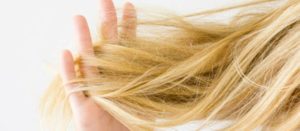Figure Out the Cause of Your Hair Loss
Once you notice extreme shedding, it’s important to see a dermatologist or internist to find out the cause. Through a series of questions about your medical and family history, as well as tests such as blood work, doctors can pinpoint if your thinning is the result of a genetic predisposition (are your parents thinning?) or triggers such as hormonal imbalance, stress, poor nutrition, having a baby, sudden weight loss, or a medical condition such as a thyroid issue.
What Is Genetically Driven Thinning?
The most common type of hair loss is androgenetic alopecia, or female or male pattern balding. In women, this type of thinning appears from the temple to the crown and is an indication that you’re genetically dispositioned to hair loss. In genetic thinning, the crown of the head has a sensitivity to the hormone dihydrotestosterone (DHT). Ultimately, DHT causes hair follicles to become finer, smaller, and weaker. DS LABS is a professional pharmaceutical hair care product line that acts as a DHT BLOCKER. Even with this predisposition, thinning is often multifactorial, meaning lifestyle factors can accelerate it.
Healthy Scalp is Fundamental to Preventing Hair Loss and Encouraging Hair Growth
Treat your scalp the way you treat your face. Your scalp is a tissue that benefits from being healthy and clean – it is an extension of your facial skin. So, make sure you’re washing and caring for your hair and scalp enough – the belief that washing your hair every day is not good for your hair is obsolete – and NOT healthy for your scalp. Plus, having a clean scalp will ensure whichever topical treatment you use gets absorbed efficiently.
Manage Your Stress
Many health issues are caused or amplified by stress, so it’s no surprise that stress is a main cause of hair loss. Traumatic life situations such as car accidents, divorce, or death in the family can throw the normal hair cycle out of whack (typically 90 percent of your hair is in the growth part of the cycle; ten percent is in a resting or falling-out phase). In very high-stress situations, 40 percent of your hair will shift to that resting phase and will sit there for three to four months. Then, three to four months later you see hair shedding everywhere. Once the trauma passes your hair will self-correct.
However, daily stress like a demanding job can be damaging, too. When you’re under stress all the time, cortisol levels stay higher than they should and cortisol affects your thyroid, it affects your hormonal balance, it robs the body of nutrients, and digestion is affected. When these systems get out of balance it leads to more hair loss than normal. Experts underscore that stress management is key to a happier life and healthier head of hair. Another crucial lifestyle switch: Make sure to get seven to eight hours of sleep each night.
Fuel Your System with Balanced Meals
You know how you skip breakfast every day? It’s not doing you or your hair any favors. Nutrition and hair are so interconnected. Hair is a nonessential tissue. So, if you’re not getting the right nutrients, the body says, “Look, this tissue doesn’t matter.” It’s going to take care of vital organs first. All this is to say that your hair is going to be last in line to get those key nutrients.
Make sure to fuel your body well. Start the day with breakfast, and don’t have any long gaps-over four hours-between meals. The point is you’re trying to avoid dipping and crashing, and that doesn’t mean grabbing a chocolate croissant or cereal bar on the way out the door. You want to anchor breakfast and lunch with protein sources. Color variety and balance is always key because you’re broadening the pool of absorption of all kinds of minerals and vitamins. Great options include eggs or egg whites in the morning or a Greek yogurt with fruit and flax. And it doesn’t work if you do it just do it here and there, consistency is key. Supplementing your diet with a high quality comprehensive multi-vitamin and mineral formula is also key to supporting the entire immune system – and will help with hair growth.
Contact Info
Store Hours
Sunday 10AM - 3PM
Salon Policies
Contact Info
Store Hours
Sunday 10AM - 3PM

